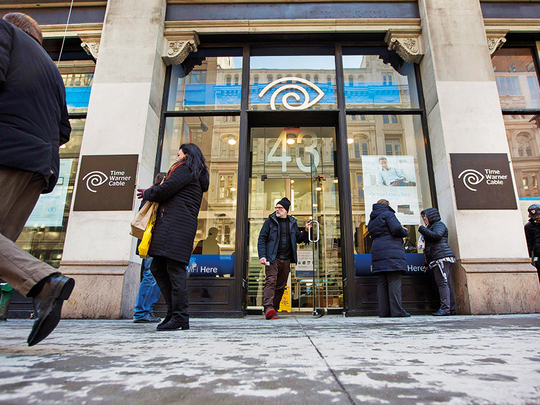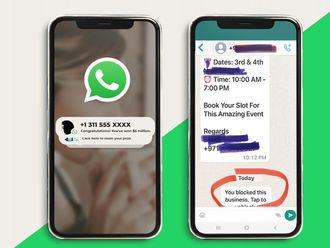
Washington, New York
US antitrust officials have started talking to representatives from AT&T Inc. and Time Warner Inc. about possible conditions that could secure approval of their $85.4 billion (Dh314 billion) tie-up, according to people familiar with the matter.
The early-stage discussions suggest that government lawyers have nearly finished their months-long look at how AT&T, the biggest pay-TV distributor, would reshape the media landscape with its bid for the owner of CNN and HBO — and shows that the sides have moved on to talking about how they can make the merger work without harming rivals.
US antitrust officials, who have blocked many tie-ups between direct competitors, rarely step in to stop vertical deals like this one. But the Justice Department is under pressure not to wave this merger through. Media and pay-TV competitors have told department lawyers they fear AT&T would favour the in-house programming that it would acquire, two people familiar with the matter said. Democratic lawmakers have said the deal could lead to higher prices and fewer choices. And President Donald Trump said during the campaign that the tie-up would concentrate media power.
Good behaviour
What antitrust lawyers are now focusing on, the people say, is whether AT&T could make vows of good behaviour that are persuasive enough to satisfy officials — showing, for example, that it won’t use its weight to unfairly advantage its own programming. Such conduct remedies are standard in vertical deals like this one. AT&T is open to conditions to ease concerns, its Chief Executive Officer Randall Stephenson told CNBC last year after the deal was announced.
One challenge: Justice Department lawyers are starting talks without their new boss being able to weigh in on a deal that would make AT&T a media and telecommunications empire. Trump’s nominee for the Justice Department’s antitrust chief, Makan Delrahim, is awaiting Senate confirmation.
Delrahim doesn’t see big issues with the deal, judging by his public statements. He told senators earlier this year that vertical mergers don’t typically raise competition problems. He also said last year before his nomination, that the Time Warner deal doesn’t raise big antitrust hurdles despite its size because it unites a pay-TV distributor with a content provider. People familiar with his thinking say he isn’t a fan of conduct remedies. If he rejects behavorial fixes, he could either sue to block the deal — or wave it through without changes.
Resist pressure
Career lawyers at the antitrust division would probably resist pressure to go beyond conduct remedies and recommend a lawsuit to block the deal, said Chris Sagers, a professor at Cleveland-Marshall College of Law who teaches antitrust law. Going to court to stop the tie-up would be a losing battle for Delrahim, Sagers said.
“He’s going to be very sophisticated and savvy about political issues, so maybe he is the sort of guy who will care a lot about what the White House thinks, but it’s going to be a hard push to get the antitrust division to do something obviously contrary to the division’s own history and the law everyone there believes in,” Sagers said.
The White House has traditionally stayed at arms length and allowed antitrust investigations to run independently. That was before the Twitter president. Trump calls CNN “Fake News CNN” and posted a wrestling video doctored to show him pummeling someone whose head is replaced with CNN’s logo. The White House is closely monitoring the deal because Trump is worried about media concentration, according to one official. At the moment, Trump is leaving the review in the hands of the Justice Department, the official said.
AT&T and Time Warner declined to comment. A White House spokeswoman referred questions about the deal to the Justice Department, which declined to comment.
Worried companies
The last big deal between a distributor and a content provider was Comcast Corp.’s acquisition of NBCUniversal in 2011. Back then, regulators imposed conduct remedies on the cable giant aimed at preventing it from thwarting online rivals like Netflix Inc. Media companies worry about an AT&T-Time Warner tie-up even more than they did about the NBC deal because it would give the telecom company unprecedented power, one of the people said. Unlike cable companies, which are restricted to regional markets, AT&T reaches the entire country through its satellite and wireless services.
The fear of operators of premium channels such as Showtime and Starz is that AT&T will favour Time Warner’s HBO in marketing, packaging and online distribution. These networks rely on AT&T’s DirecTV to promote their channel to customers. They are concerned that DirecTV could make HBO exclusive to its customers or not count streaming HBO on phones toward AT&T subscribers’ wireless data, the person said. Their concerns were heightened when the telecom giant recently began offering HBO for $5 a month to subscribers of its new online TV service, DirecTV Now, instead of $15 customers must pay HBO for its own streaming service, HBO Now.
‘Must carry’
Premium channel owners want the Justice Department to impose a “must carry” condition that requires DirecTV to include their channels anywhere they sell HBO, including when it markets products to potential customers, the person said. They also want restrictions barring DirecTV from substituting their channels for HBO’s sister network, Cinemax. Showtime and Starz declined to comment.
Another possible condition would be to bar AT&T from giving slower streaming speeds to Netflix and Amazon.com Inc. users than to those of HBO. Media companies also want the Justice Department to appoint industry experts to regularly check whether AT&T’s conditions are being met and create specific enforceable penalties, the person said.
Lawmakers pressuring the administration over the deal include Senator Amy Klobuchar, a Minnesota Democrat. She wrote to Attorney General Jeff Sessions earlier this month, after the New York Times reported that the White House was considering using the merger review as leverage over CNN, asking him if the White House has had any contact with the Justice Department about the deal. Political interference in antitrust enforcement is “unacceptable,” she wrote. Delrahim told senators he’s had no conversations with the president about the deal.
A group of lawmakers, including Senator Al Franken of Minnesota and Elizabeth Warren of Massachusetts, last month said the deal will lead to higher prices and fewer choices for consumers and urged the Justice Department to consider blocking the deal. They argued that conditions to regulate AT&T’s behaviour would be unenforceable and unreliable.
“From forcing its customers to buy bigger bundles of Time Warner’s programming to foreclosing rival content creators’ access to AT&T customers, AT&T-Time Warner could engage in a wide variety of behaviours that would harm competition in the media market,” they said.
— Bloomberg












